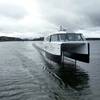The Bush administration's plan to open an Alaskan wildlife refuge to oil drilling was approved by the House of Representatives early on Thursday, but it faces a tougher fight in the Senate, which wants U.S. energy policy to focus on conservation.
The key issue in the debate over a broad national energy policy is the fate of the Arctic National Wildlife Refuge (ANWR), home to polar bears, caribou and 160 kinds of migratory birds.
While green groups and many Democrats view the remote and pristine refuge as an American Serengetti, drilling proponents contend oil and gas could be safely extracted from a tiny area.
Republican-led House passed, on a 240 to 189 vote, a comprehensive energy bill that included drilling in ANWR.
A separate amendment to the bill to block drilling in the refuge failed on a much closer vote, 223 to 206, handing a huge victory to the White House. The vote was a defeat for green groups, some of which had threatened to work to defeat pro-drilling lawmakers in next year's congressional election.
Democratic-controlled Senate was to finalize its energy bill in September, after Congress returns from vacation.
Vice President Dick Cheney, a former top executive of oilfield services giant Halliburton Co., praised the House vote.
"A lot of the pundits said we'll never get an energy bill out of the Congress," Cheney said, adding that the House vote was "surprisingly strong."
Lobbying by the Teamsters Union, which backs drilling for the jobs it would create, helped woo three dozen Democrats. An equal number of Republicans voted to protect the refuge.
"Now our battle goes to the Senate," said Jerry Hood, the Teamsters' energy adviser. "The Teamsters have the facts and the momentum to get this legislation to President Bush's desk for his signature."
Sen. Frank Murkowski of Alaska, the top Republican on the Senate Energy Committee, said he looked forward to a debate in the Senate on drilling.
"One thing is clear, reports of ANWR's demise have been greatly exaggerated," he said.
The Senate, which has yet to finish drafting an energy bill, is virtually certain to focus on conservation and energy efficiency instead of more drilling on federal lands.
Senate Majority Leader Tom Daschle declared drilling in ANWR dead months ago.
"I do believe the votes are there to prevent it," he said. The South Dakota Democrat acknowledged the promise of new jobs in the Alaskan refuge was a strong selling point for the Republicans but said the environmental risks were too great.
"I truly believe that the vast majority of the American people want us to find our oil elsewhere," Daschle added. The Alaskan refuge would provide only about six months' worth of U.S. oil needs, he said.
Former vice presidential candidate Sen. Joseph Lieberman of Connecticut and Sen. John Kerry of Massachusetts vowed to block any ANWR drilling legislation. About a half-dozen moderate Republican senators - mostly from Northeast states - are on record opposing drilling.
"I will filibuster any effort to drill in the refuge," Kerry said. "It will never pass the Senate."
"In the end, we can create millions more jobs cleaning the environment and developing clean energy technologies than we can polluting and destroying one of the last pristine places on the face of the earth," Kerry added.
And Senate Democrats contend that stricter conservation measures - such are requiring Detroit to make gas-guzzling sport utility vehicles that get better mileage - would save more oil than can be drilled from ANWR.
Opening the refuge is critical to the White House's goal of boosting U.S. energy supplies and reducing imports of oil.
Government estimates say the refuge may hold 16 billion barrels of crude. The U.S. market consumes close to 20 million barrels of petroleum a day and must import about half of that.
The White House maintains drilling would require only about 2,000 acres of the refuge's 19 million acres, and would not harm the environment.
However, green groups say that 2,000 acres would not include all roads and pipelines built to support any drilling.
"The acreage for oil drilling won't be the small, compact area that some members of Congress would have you believe," said a spokeswoman from the Sierra Club. "In reality, the oil development would be a sprawling web of destruction stretching across hundreds of square miles."
Interior Secretary Gale Norton, whose department would issue rules for any ANWR drilling, said exploratory wells - which are not permanent fixtures - might not be included in the 2,000 acre figure.
"It's only the permanent facilities that count in the 2,000 acres," Norton said.
The U.S. Public Interest Research Group said the House bill would mean more pollution and give some $33 billion in tax breaks to energy firms already earning record profits.
"We hope that when the Senate takes up the energy issue, they develop a safe energy plan to lead America to a smarter, cleaner energy future," said PIRG director Gene Karpinski.
Featured videos

Tracking Foreign Vessels Working in the U.S. Jones Act Market

Inmarsat Enhances Service to Drive Digitalization

Inside the Electrified Truckable Tug
Subscribe for
Maritime Reporter E-News
Maritime Reporter E-News is the maritime industry's largest circulation and most authoritative ENews Service, delivered to your Email five times per week









